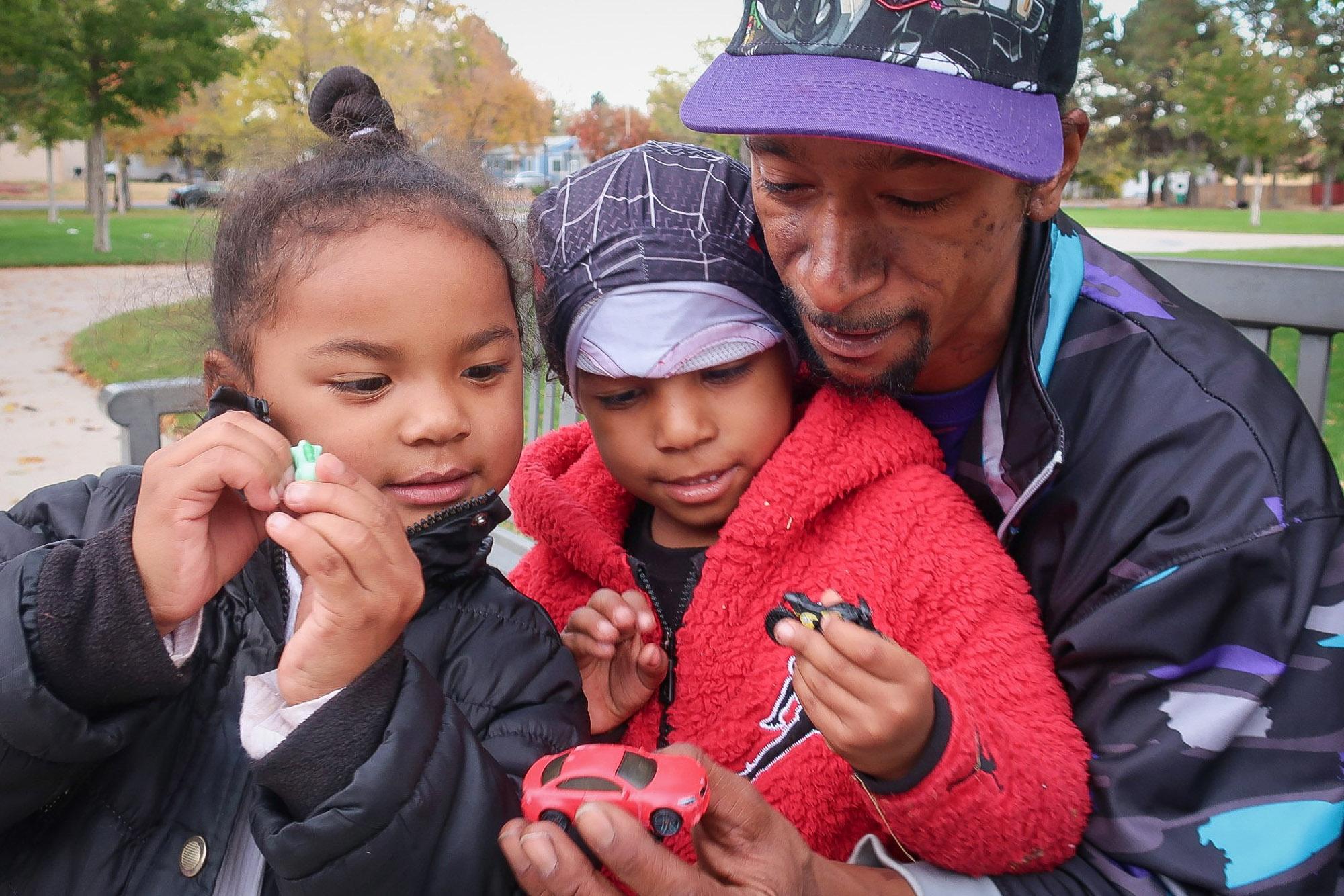
When I ask John Thomas Barton IV, a bespectacled 4th grader, whether he will get a COVID vaccine, he does a lot of karate kicks to convey his enthusiasm for the shot. He tells me he has already had four other immunizations for school. “Four! So, I already know what the pain feels like. I am excited. I really want to get this vaccine because if anyone has COVID, I know my system will be able to fight it.”
His brother Max, who is in first grade, hates shots, but he will also get the vaccine. His mother has a serious heart condition, and the family is living with their grandmother, temporarily.
Max’s strategy for the shot? “Just suck the tears up,” he states. For more than a year-and-a half, nearly half a million Colorado children have maneuvered through the pandemic without being eligible for a vaccine. On Friday, the Food and Drug Administration authorized emergency use of the Pfizer-BioNTech vaccine for 5 to 11 year-olds. An FDA advisory panel said the vaccine is safe and 90.7 percent effective in preventing COVID-19 infections.
It recommended giving child-sized doses (one third the dosage that people older than 12 receive) in two shots. Following the FDA’s authorization, the Centers for Disease Control and Prevention is set to consider how to best use the vaccine, and children could start getting shots in early November. The FDA decides whether the vaccine is safe and effective and the CDC decides on who will benefit and who should get vaccinated, for example the entire 5 to 11 year-old population or a subset.
“The vaccine is safe and effective for children — it works extremely well to prevent infection and severe illness,” said Dr. Eric France, Chief Medical Officer at Colorado Department of Public Health & Environment, in a press conference on Thursday.
COVID cases in children rose 400 percent in August and September from the summer, Dr. France said, citing a study that shows there is a one in four risk of being exposed to the virus by a child at home. “Vaccinating children will help keep them healthy, help them stay in school and help make sure they don't spread the virus to members of their family,” he said.
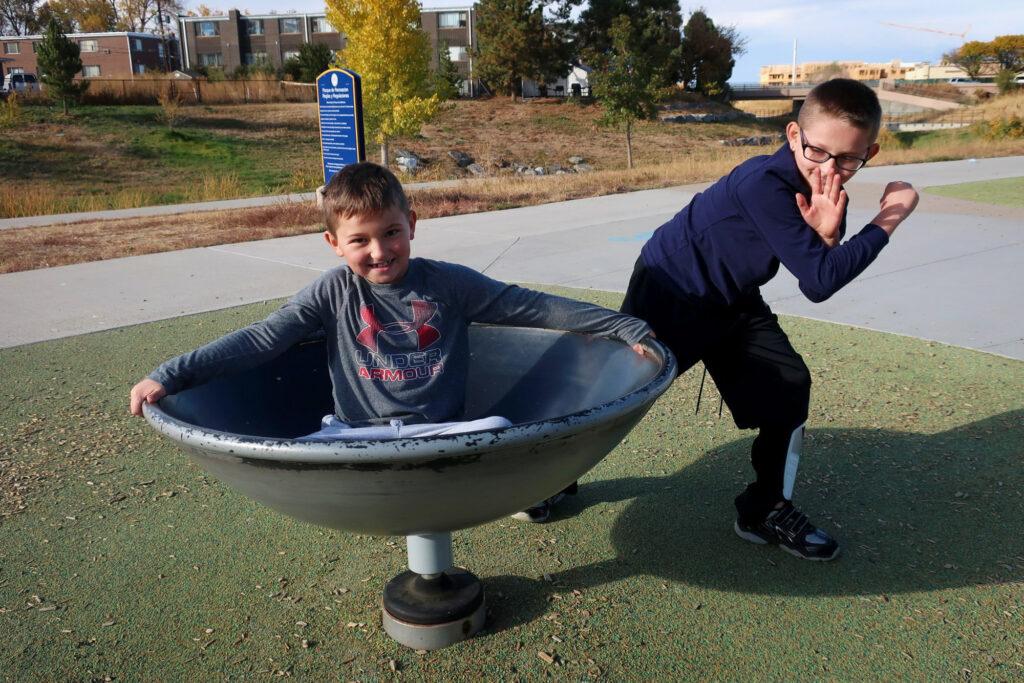
Colorado has a goal of reaching 50 percent of young Coloradans with the first dose of COVID-19 vaccine by January 31, 2022. The state has received 171,000 doses in the initial allocation — enough to vaccinate almost a third of the age group with a single dose.
To prepare for the rollout, the state is planning an “immense mobilization effort” beginning with vaccine clinics for children at central places like the Denver and Pueblo zoos, and at children’s museums and libraries. A later phase of the rollout will include setting up clinics in school districts.
Beginning Friday, Nov. 5, the CDPHE is partnering with Children’s Hospital Colorado to offer vaccine clinics for children ages 5 to 11.
Some providers are already accepting COVID-19 vaccine appointments for children in the age group. The state said many more providers will start taking appointments following official recommendations from the CDC. The state campaign includes 384 clinic locations statewide.
‘It’s just not something I trust right now’
A recent poll by Ipsos shows half of parents of 5 to 11 year-olds plan to get their children vaccinated, while 20 percent are unsure. Others don’t have plans to get their children vaccinated or are taking a wait-and-see approach.
“It’s just not something I trust right now…maybe later but not right now,” said Cree Mortensen, mother of Drew, a 7 year-old.
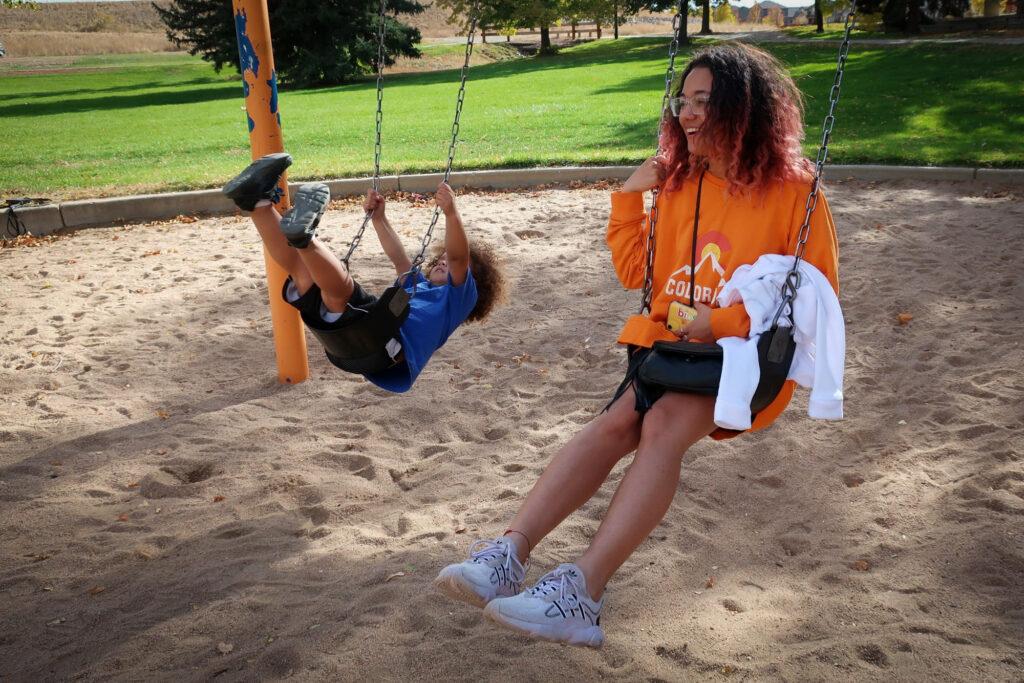
Mortensen says she has researched the vaccine and has thought a lot about it. She got COVID once. Her vaccinated mom, who works in healthcare, got a breakthrough case three months ago and is still having her lungs checked out because of breathing trouble. But to Mortensen, that just means, “I’m going to get it either way. You know, it’s like the flu.”
But she said she won’t stop her son if he wants the vaccine.
I asked Drew if he thinks a shot is the kind of thing that could protect him from the coronavirus. He nodded yes. And then asked me, “Does it?”
In the end, he decided: “I don’t want to do it.”
Not surprisingly, young children tend to echo the views of their parents.
‘Children aren’t politicizing vaccines; adults are’
The Ipsos poll shows Black parents are significantly more concerned about their children getting COVID than white parents.
Javier Toussaint is vaccinated, and is the father of five. He said he’s frustrated that some people won’t listen to the experts — the scientists and doctors. As a way of comparison, he said that he would never argue with his mechanic. “If I take my car in there [and] he’s like, ‘transmission is shot and I don’t even know how you made it here,’ I’m not going to sit there and be like, ‘it’s my pistons,’” Toussaint said. “I’m not with people doing that to doctors.”
It’s doctors who have helped his 11-year-old daughter who has the sickle cell trait. She is healthy, but had her spleen — a part of the immune system — removed, which makes her more at risk of serious illness.
“I can’t wait until they call me from the oncology department and say ‘hey, we’re going to be able to give your daughter the vaccine for COVID,” Toussaint said. As soon as the vaccine becomes available, he will get it for his daughter.
Toussaint said he wishes more people understood that some things we do are for the community.
Parents like Katti Evans agree. She said children aren’t politicizing vaccines; adults are. “That’s not how a community works together to protect our kids. We’re putting our egos in front of our children’s futures and I don’t think that’s right.”
Evans said vaccines will keep children learning inside schools, which is critical to their social and emotional development. It will lessen teachers’ worries, she said, “not having to go home with this anxiety about which kid brought COVID to school today.”
For children like her 9 year-old, Chevelle, the pandemic has been confusing, but when asked if she will get the COVID-19 shot, Chevelle took a moment to think. “I’m not a big fan of needles,” she said. “But I do know I want to be safer, so I don’t really know what to say, like, maybe like half and half.”
She said she will eventually get it, but “probably not, like, right away right away.”
Evans agreed and said they will wait to see how the rollout goes. Plus, she’ll need to talk to Chevelle’s biological father in Texas.
Divorce lawyers have advised that it’s best to inform the other parent if one parent has sole-decision making authority, or to get consent if there is joint-decision making.
‘We just want to make sure it’s safe and good to go’
Children’s Hospital Colorado was the largest research site for the Pfizer vaccine trial in the 5 to 11 year-old age range. In clinical trials, younger children tended to have milder side effects after getting the shots than those over 12, said Dr. Lalit Bajaj, a pediatric emergency medicine specialist and chief quality and outcomes officer with Children’s Hospital.
He said he has treated some “very, very, very rare side effects” of myocarditis, or inflammation around the heart, in vaccinated youth age 12 to 17 those youth recovered in a day or two. He said in contrast, he has seen worse heart problems in unvaccinated children infected with COVID.
In a Thursday press conference, Governor Jared Polis underscored that point.
“For parents who might be hesitating, the risk of your kid developing myocarditis or heart problems is exponentially greater if they contract COVID than if they get the vaccine.”
According to a Kaiser Family Health Foundation survey published Thursday, the majority of parents surveyed said they will not get their younger children vaccinated right away.
Svetlana Nikic said her daughter, a first grader, will definitely be vaccinated and her pediatrician recommends it. But Nikic said she will likely wait a few months to make sure there aren’t any new reports of cardiac inflammation.
“Ultimately, we’re pro-vaccine, we're just tiptoeing in the water because she’s so young, we just want to make sure it’s safe and good to go,” said Nikic.
For now, the family remains cautious. Her daughter, who the family registered for remote learning when the Delta variant began spiking, wore a mask at the park.
‘It’s just chaotic’
Other parents seem so overwhelmed by the avalanche of opinions swirling around on social media that they have withdrawn.
“We don’t really think about the COVID, because I think it sucks you in,” said Juanita Gonzalez, a mother of a 10 and a 12 year-old. “It makes you nervous, it makes you scared if you watch the news, it’s just chaotic.”
When the pandemic first started, Gonzalez said a lot of people felt depressed or lost. She decided to step back and stay on the sidelines. She feels better not engaging. Asked if she would take advice from her pediatrician, she said her children haven’t seen a pediatrician in a while, but she hopes to get them in for a physical soon.
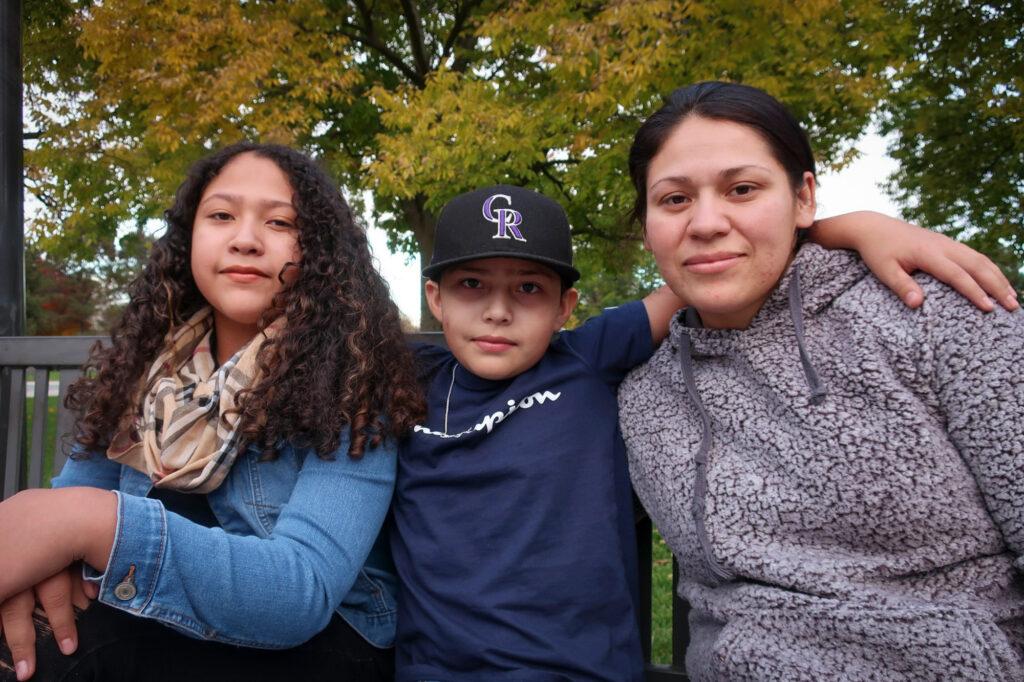
“I feel like when I make that decision for my family to get vaccinated, I want to feel comfortable for myself and my family – not because everybody else is doing it,” Gonzales said. “When I choose to do it, I want to feel like it’s the right thing I’m doing.”
Her 12-year-old daughter Emily, echoed her mother’s concerns. She said she saw a video about how the vaccine can make you magnetic, but said she didn’t believe it. “I feel safe and not safe. I think the vaccine — I don’t know the chemicals it contains, and [I’m] pretty scared of it.”
‘I will get it as soon as I possibly can’
For the past year and a half, some families have done everything, except school, outside. No movies. No restaurants. No indoor play dates. They are ready to get back to normal.
“I have been waiting to get the email from my daughter's pediatrician,” said Margaret Colburn, mother of 10-year-old Esther and 7-year-old Charlie. “I will get it as soon as I possibly can.” Vaccinating her children will provide some extra comfort for when they spend time with their grandmother (who is vaccinated), and it will mean more freedom for them.
Nearby, Esther played with her friend Vivien Jones, also 10 years-old. Vivien asked Esther what she is going to do after she gets both shots.
“Have a sleepover, paint my nails and get my ears pierced,” said Esther, without skipping a beat.
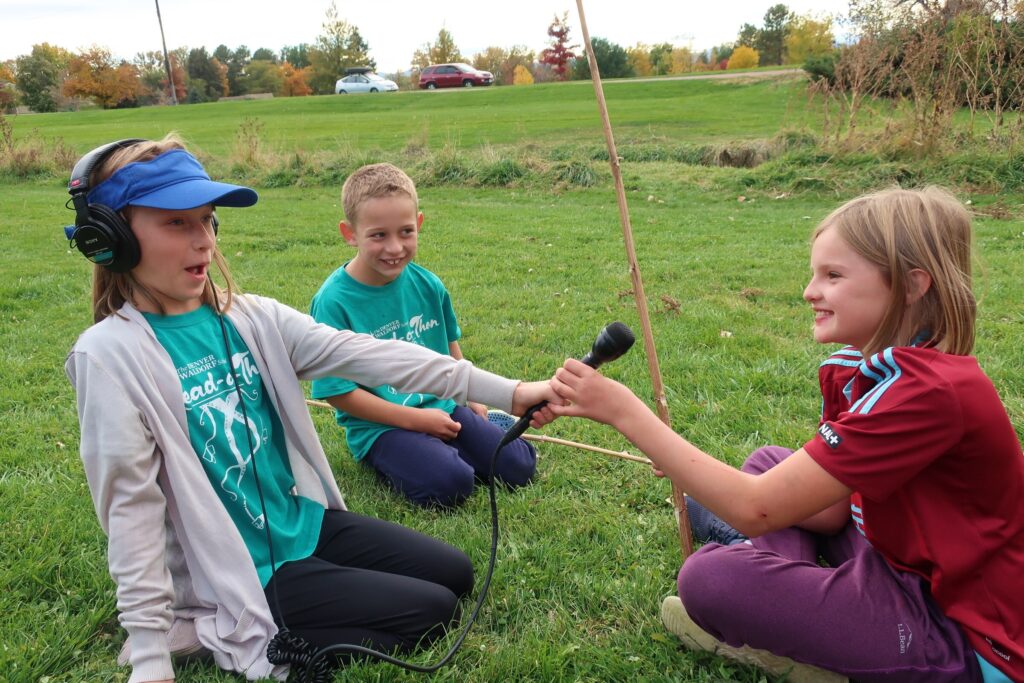
Vivien’s mom, Pam Zachar, a neonatologist, said she has seen a lot of people who have stopped caring about whether the pandemic ends. “They’ll say that they are over it, but it’s not over,” said Zachar. “That’s been really hard and it’s been hard to explain that to my daughter.”
The vast majority of the nation’s school children – unlike people in bars and restaurants – have had to wear masks since they re-entered school in 2020. Zachar said not being able to wear a mask in school would make a huge difference to her daughter.
“But because it would require a lot of parents to have their children vaccinated,” she said. “I don’t know how quickly me getting her vaccinated is going to make those kinds of things change.”









